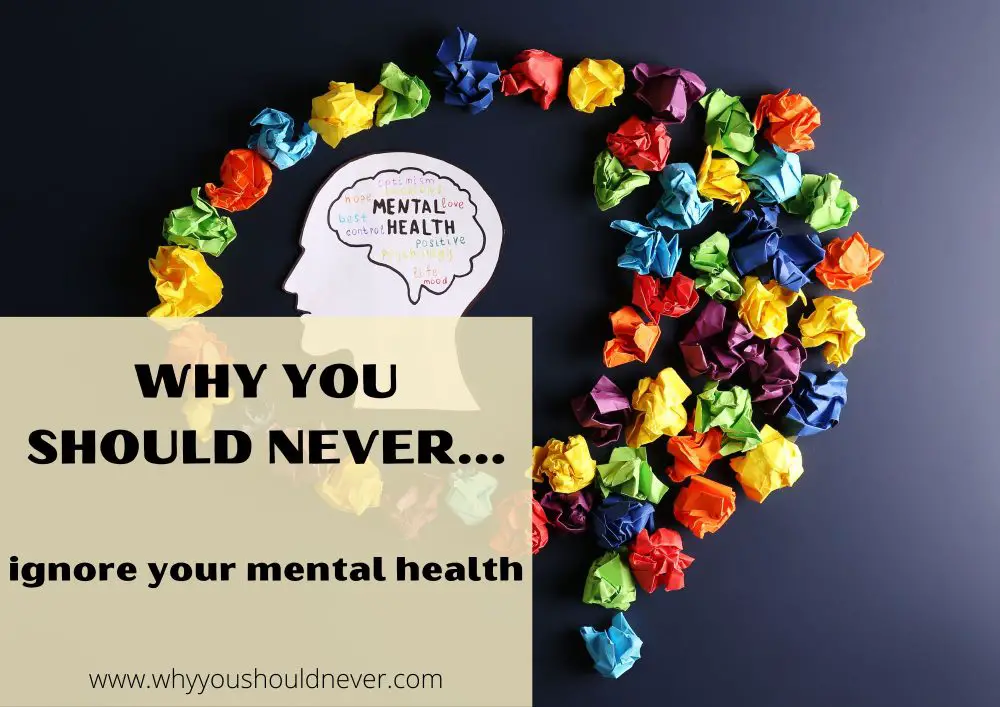![]()
Why You Should Never Ignore Your Mental Health
We’re told to see a doctor when some thing is wrong with our physical health. We’re told to see a dentist when our teeth are hurting. But why is it that we’re not as readily given the same advice when it comes to our mental health? Why do we tend to ignore our emotional and psychological needs?
Maybe it’s because we think that mental health issues are not as serious as physical health issues. Maybe it’s because we’re afraid of being judged. Or perhaps we just don’t want to admit that we’re struggling.
Whatever it is that’s making so many people reticent about seeking help for their mental health, it’s important that we change our attitudes and start taking care of our emotional and psychological well-being.
In this article, we’ll explore some of the many reasons why taking care of our mental health is crucial.
9 reasons why you shouldn’t ignore your mental health
1. Mental health affects physical health
The mind and body are intimately connected, and your mental health can have a significant impact on your physical well-being.
For example, chronic stress can lead to high blood pressure, heart disease, and other physical health problems that can end up killing you.
Depression and anxiety can also weaken the immune system, making you more susceptible to illness.
2. Mental health affects relationships
When you’re struggling with your mental health, maintaining healthy relationships can become challenging, to say the least. Your mood swings or erratic behavior is bound to hurt your loved ones, leading to conflicts and misunderstandings.
Either you will start to withdraw from them, or them from you, because who wants to be around someone who’s constantly irritable or unpredictable?
3. Mental health affects work performance
When you’re not feeling your best mentally, it’s hard to focus on work and be productive. You may be more prone to making mistakes, missing deadlines, or calling in sick more often.
This could have a knock-on effect on your career progression, leading to missed promotions or even job loss. And we all know how financially devastating it is to lose a job…
Moreover, it’s hard to enjoy your work and find fulfillment in your career when your mental health is suffering. Sooner or later, it will start to take a toll on your job satisfaction, no matter how much you love what you do.
4. Mental health affects self-esteem
When you’re struggling with your mental health, it’s easy to fall into a negative spiral of self-doubt, self-loathing, and low self-esteem.
You might start to beat yourself up for your perceived inadequacies or failures, leading to feelings of worthlessness or hopelessness. This can be a vicious cycle that’s hard to break out of.
5. Mental health affects daily life
Mental health issues can make even the simplest tasks feel overwhelming. Going to the grocery store or doing laundry can seem like insurmountable challenges when you’re struggling with depression or anxiety.
You know those hobbies you used to enjoy? They lose their luster when your mental health declines. You might find yourself canceling plans with friends or avoiding social situations altogether, which only intensifies feelings of isolation and loneliness.
The reality is that mental health issues can make it hard to find joy and meaning in life, which is a tragedy.
6. Mental health issues can worsen if left untreated
A mental health problem, if left untreated, can worsen and develop into more severe conditions. For example, depression can lead to suicidal thoughts, anxiety can lead to panic attacks, and PTSD can lead to flashbacks and nightmares.
Ignoring the symptoms of mental health issues, more often than not, paves the way for their progression, which is why seeking help early on is crucial.
7. Seeking help is a sign of strength, not weakness
There’s a common misconception that seeking help for mental health issues is a sign of weakness, but this couldn’t be further from the truth.
In reality, it takes a lot of courage and strength to admit that you’re struggling and to seek help. It’s a sign of self-awareness and self-care, and it’s something that should be celebrated, not stigmatized. After all, you wouldn’t look down on a person with cancer who goes to an oncologist for treatment.
8. Missed opportunities
This one might seem like a bit of a stretch, but hear me out. Many jobs, careers, or other opportunities require that candidates have good mental health. If you’re neglecting your mental health, you may miss out on opportunities that you could have otherwise taken advantage of.
For instance, some jobs in the military or law enforcement require that candidates have good mental health. Or, perhaps you’re interested in fostering or adopting a child. Your mental health struggles would make it difficult for you.
9. You won’t be the best you
When you’re not taking care of your mental health, you’re not being the best version of yourself. You’re not able to show up for yourself, let alone for others.
Taking care of your mental health helps you to be more present, patient, and empathetic. You’ll be able to connect with others more genuinely and enjoy life more fully.
Final word
Mental health is just as important as physical health. Just because you can’t see mental health issues doesn’t mean they’re not real or important. Our emotions and thoughts are just as important as our physical bodies.
We need to start viewing mental health as an integral part of our overall well-being, and stop treating it as something to be ashamed of or ignored.
The more we prioritize our mental health, the better equipped we’ll be to lead fulfilling, healthy lives.
